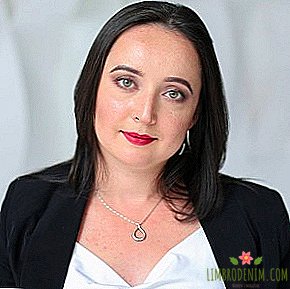Lawyer Marie Davtyan about domestic violence and helping women
IN RUBRIC "BUSINESS" We acquaint readers with women of different professions and hobbies that we like or are simply interested in. In this issue, we talked with Marie Davtyan, a lawyer and human rights activist who provides legal assistance to women victims of sexual and domestic violence. Davtyan told how she revised her views on gender discrimination, why domestic violence is a non-prestigious area for lawyers and how attitudes towards such cases in Russian law enforcement agencies change.
About the dream of becoming a lawyer
I decided that I would be a lawyer at the age of twelve, after seeing an old Soviet film where a lawyer defended an innocent guy in court - I was very impressed with this plot. In high school, I began to prepare for admission to law, even went to school, where there were special classes at the Russian Academy of Advocacy, which I graduated from.
Cases of domestic and sexual violence were not discussed at the university, although the university was always quite liberal. This topic among lawyers in general was a bit marginal. When I began to engage in human rights, many colleagues said that I spend time in vain. But everything is changing: I am currently studying in the HSE postgraduate school and I see that not only discrimination of women, but also representatives of LGBT people is discussed in pairs.
My practice is divided into two parts: women's advocacy and the usual lawyer. We are working with a team dealing with issues of corruption, protection of private property, divorce, division of property and alimony. There are people who are focused on arbitration cases, but I work more with criminal ones. However, we do not have streaming work, so we do not conduct fifty divorce cases at the same time. We occupy a segment with complex issues that require a large team of professionals, long work and hard work.
The beginning of advocacy
At first, I dealt with arbitration issues, that is, I was in charge of business organizations. With regard to the business, the repressive apparatus works quite actively, so that at one moment it was necessary to conduct criminal cases. In parallel with this, I became involved in human rights activities. It began this decade ago, when I was twenty and I had not even received a lawyer's license. At first, I simply helped women's NGOs with controversial points in registration. I was very lucky, I had never seen violence, and therefore it seemed to me that these activists were engaged in some sort of nonsense. At first I thought that there was no discrimination, but then I began to delve deeper into this topic and realized that even my friends suffered from violence, they were just silent about it. I was really shocked by the scale of the problem and decided that I was obliged to help others both as a lawyer and as a woman who was lucky to some extent more than many others. This is my social responsibility.
Now I try to cooperate with all organizations that do a good job. It all began with the "Consortium of women's non-governmental associations" and its former leader Elena Ershova - "equal rights", as she called herself. Thanks to her, I was in this thread. I also work together with the center "Anna" and the center "Sisters". Women's human rights environment is quite closed, so everyone tries to help each other as far as possible.
"Consortium" and "Violence.net"
In the Consortium of Women's Non-Governmental Associations, I am leading a project that legally helps women who have suffered domestic or sexual violence throughout Russia. The "Consortium" includes more than a hundred organizations in different regions. They turn to us if they are confronted with violence against a woman and are unable to find and pay for her lawyer. We help to find a specialist in this region and pay him a fee. Women can contact the Consortium’s central office directly and get help.
I fully coordinate the provision of such legal assistance: I follow the development of the case and help lawyers to develop a defense strategy. This format has been operating for three years in different parts of Russia - from Vladivostok to Kaliningrad. There are lawyers in the regions who work with us on an activist basis - thanks to them, this project lives and develops. On the one hand, we are creating an all-Russian network of specialists on such issues, and on the other hand, we help local NGOs to find lawyers to solve specific problems.
I was faced with the fact that ordinary people are not so easy to find information about such crimes - it is not collected in one place. So, together with Anna Rivina, we managed to launch the Violence.net project, an Internet platform where you can find all the information about violence against women and discuss it in a civilized manner.
Thanks to my legal practice, I noticed that in the event of an attack, women often do not have time to call for help. The first thing they take away from the victim is a mobile phone, sometimes it is impossible to make even one call. And in our application (The project “Violence.Net” has a mobile application that helps to quickly get help to women who have been attacked. - Ed.) You can call for help by pressing only the button. After that, someone from close people will receive an SMS or an email asking for help, as well as an indication of the place where the woman is located. We have been collecting money for this application for a long time and as much as we try to refine it. But there is a necessary minimum - an alarm button and a list of crisis centers nearby.
Domestic violence in court
I do domestic violence cases on my own and notice that legal proceedings in this area are very different from other legal practices. In cases of violence against women, stigma is felt immediately. Law enforcement agencies make it very clear that the victim is to blame for what happened - from the time of writing the first statement to the court’s decision. It all starts with the fact that the judge invites the parties to reconcile. That is, these cases are not perceived as a full-fledged crime, but as a quarrel between two people, which the court must somehow resolve, and this is noticeably annoying.
For some reason, it is believed that when it comes to domestic violence, the victim is obliged to prove something. But, by and large, law enforcement agencies should investigate a crime and collect evidence. But they are often suspended, pretending that they are internal family matters. If your wallet is stolen from you and you contact the police about this, a criminal case is opened, an investigation begins and no one asks you any stupid questions. And if you come to the police and say that your husband beat you, it begins: "Are you sure? Or maybe you're lying? Maybe you thought?"
A woman cannot prove it on her own, simply because she does not have authority and does not know how to collect evidence. And such criminal cases fall into the category of private prosecution (if we are talking about inflicting light health damage), where the victim must collect evidence himself. By the way, 87% of acquittals are held for private prosecution cases. And, for example, a broken nose is considered a light health hazard. Is this really the result of petty family conflict? Personally, I don't think so.
But due to the decriminalization of the first incident, the situation has worsened. When you institute a criminal case, you get a number of important rights, for example, you can appeal the inaction of the authorities. In addition, the police officer is obliged to conduct an inspection and take some decision. And when we talk about administrative matters, the security official may simply not draw up a protocol - he will have nothing for it. The police say that due to the fact that this figure is no longer taken into account, they no longer worry about such cases.
True, recently I have noticed that there are more and more understanding and adequate judges. Perhaps this is due to the wide publicity of the problem. It is also worth noting that the police, as a rule, are more sensitive than the Investigative Committee. If you can still try to make contact with the police, the employees of the IC are much callous, more patriarchal and stereotypical than any precinct from a small town.
In general, rural precinct big fellows compared to the Moscow security forces. I can say this precisely because the "Consortium" has long established links with the institute for advanced training at the Ministry of Internal Affairs, where police are sent from all over the country. Once a month a group of twenty to thirty people from all over the country are sent to us to give them a lecture on domestic violence. During this time, more than a thousand people have passed through us, and the difference between the capital and the regions is very visible.
About the power of the strong and justice
Like all human rights defenders, we get tired and even burn out periodically. But all the time I am fed up with hatred of the current situation. I react quite aggressively to violence against women, and this gives me the strength to work on. My parents say that I have a heightened sense of justice, and in general I feel the support of my family.
I have a clear feeling that our authorities are promoting the idea of the superiority of the strong. Refusal to resist domestic violence is well within the logic of the current rather repressive policy, where with the weak you can do anything. But I still see a positive trend, despite all the talk about ties and traditions. More and more people began to realize that domestic and sexual abuse is very dangerous. There were a lot of critical people, there were media that regularly cover this agenda.




